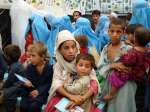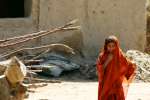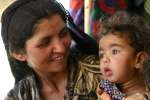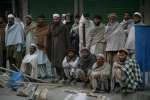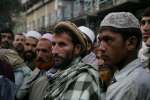UNHCR concerned by violence at Greek border, calls for improved security
Press Releases, 3 December 2015
UNHCR is deeply concerned about the tension and violence at the border between Greece and the former Yugoslav Republic of Macedonia and calls on the authorities of both countries to manage the border in a manner consistent with human rights and refugee-protection principles.
As a result of restrictions by the authorities along the Western Balkans route to the admission of refugees and migrants from countries other than Syria, Afghanistan and Iraq, tensions have been rising at Idomeni, on the Greek side of the border, in recent days. These tensions have lead on several occasions to violence and a temporary closure of the border.
In this context, UNHCR is saddened by the death of a Moroccan man at the border today under as yet unclear circumstances. This tragic incident further underlies the need for the authorities to take appropriate action. We are calling on the Greek authorities to restore security as a matter of priority in order to ensure the protection of those in need and the safety of humanitarian workers and volunteers.
Transportation has been made available for the refugees and migrants who have been refused admission into the former Yugoslav Republic of Macedonia to return to Athens, where reception facilities and assistance are available and UNHCR staff is present to offer individual advice and legal counselling on a case-by-case basis.
UNHCR reiterates its concerns over the consequences of border restrictions currently implemented by several countries in the Balkans. UNHCR recommends profiling people based on their protection needs and not on their nationality. UNHCR and other organisations have called on the concerned states to re-establish coordination and response mechanisms agreed at the Western Balkans Summit on 8 October and the Leaders' Meeting on 25 October 2015.
News contacts:
- In Geneva, Switzerland, William Spindler: +41 79 217 3011
- In Athens, Greece, Stella Nanou: +30 693 79 34 515

All in the same boat: The challenges of mixed migration around the world.
Implementation of the 10-Point Plan in Different Regions
Regional Stakeholder Conferences
- Regional Conference on Refugee Protection and International Migration in Central Asia
(Almaty, Kazakhstan, 15-16 March 2011)
- Regional Conference on Mixed Movements and Irregular Migration from the East and Horn of Africa and the Great Lakes Region to Southern Africa
(Dar es Salaam, United Republic of Tanzania, 6-7 September 2010)
- Regional Conference on Refugee Protection and International Migration in the Americas: Protection Considerations in the Context of Mixed Migration
(San José, Costa Rica, 19-20 November 2009)
- Regional Conference on "Refugee Protection and International Migration in the Gulf of Aden"
(Sana'a, Yemen, 19-20 May 2008)
- Regional Conference on Refugee Protection and International Migration in West Africa
(Dakar, Senegal, 13-14 November 2008)
Expert Roundtables
Stocking of the 10-Point Plan Project
The link between movements of refugees and broader migration attracts growing attention.
Migrants are different from refugees but the two sometimes travel alongside each other.
Monthly update: March 2014
over 4 million Syrians are now refugees
Donate now
Afghanistan: Rebuilding a War-Torn Country
The cycle of life has started again in Afghanistan as returnees put their shoulders to the wheel to rebuild their war-torn country.
Return is only the first step on Afghanistan's long road to recovery. UNHCR is helping returnees settle back home with repatriation packages, shelter kits, mine-awareness training and vaccination against diseases. Slowly but surely, Afghans across the land are reuniting with loved ones, reconstructing homes, going back to school and resuming work. A new phase in their lives has begun.
Watch the process of return, reintegration, rehabilitation and reconstruction unfold in Afghanistan through this gallery.
Afghanistan: Rebuilding a War-Torn Country
Rebuilding Lives in Afghanistan
With elections scheduled in October, 2004 is a crucial year for the future of Afghanistan, and Afghans are returning to their homeland in record numbers. In the first seven months of 2004 alone, more than half a million returned from exile. In all, more than 3.6 million Afghans have returned since UNHCR's voluntary repatriation programme started in 2002.
The UN refugee agency and its partner organisations are working hard to help the returnees rebuild their lives in Afghanistan. Returnees receive a grant to cover basic needs, as well as access to medical facilities, immunisations and landmine awareness training.
UNHCR's housing programme provides tool kits and building supplies for families to build new homes where old ones have been destroyed. The agency also supports the rehabilitation of public buildings as well as programmes to rehabilitate the water supply, vocational training and cash-for-work projects.
Rebuilding Lives in Afghanistan
The Reality of Return in Afghanistan
Beyond the smiles of homecoming lie the harsh realities of return. With more than 5 million Afghans returning home since 2002, Afghanistan's absorption capacity is reaching saturation point.
Landmine awareness training at UNHCR's encashment centres – their first stop after returning from decades in exile – is a sombre reminder of the immense challenges facing this war-torn country. Many returnees and internally displaced Afghans are struggling to rebuild their lives. Some are squatting in tents in the capital, Kabul. Basic needs like shelter, land and safe drinking water are seldom met. Jobs are scarce, and long queues of men looking for work are a common sight in marketplaces.
Despite the obstacles, their spirit is strong. Returning Afghans – young and old, women and men – seem determined to do their bit for nation building, one brick at a time.
Posted on 31 January 2008
The Reality of Return in Afghanistan


Hoping for a new life in Canada
A new humanitarian programme will see 25,000 Syrian refugees chosen and flown to Canada within the next few months. UNHCR is assisting in the process that will offer thousands a chance at a new life in a new country.


Greece: Coordinating volunteers on Lesvos
To help manage an influx of people arriving on the Greek Islands by boat, volunteer organizations and hundreds of individual volunteers have stepped in. One of UNHCR's roles on Lesvos is to work with the volunteers and coordinate their efforts.


Greece: Ramping up refugee reception
UNHCR staff are working with Government authorities, NGOs and volunteers on the beaches of the Greek island of Lesvos to receive cold, wet and fearful asylum seekers making landfall around the clock. They wrap them in thermal blankets and take them to warm, safe emergency accommodation at transit sites, with power and Wi-Fi connectivity.
 |
|  |
|  |
| 

































